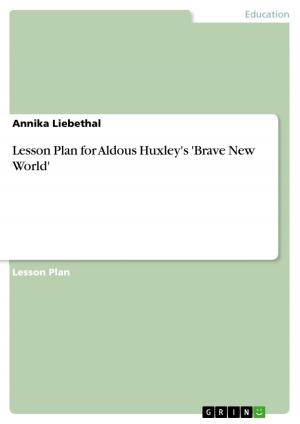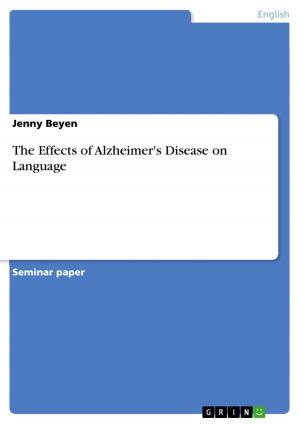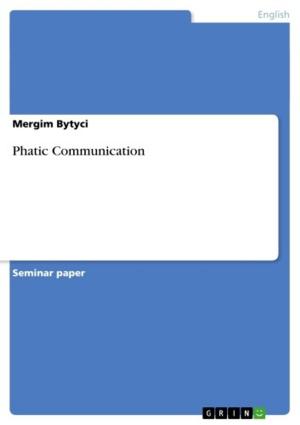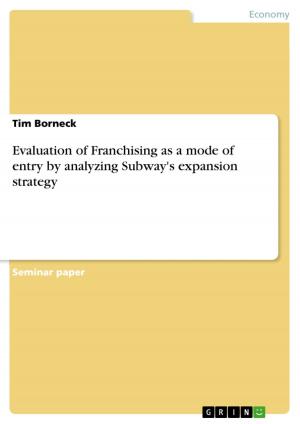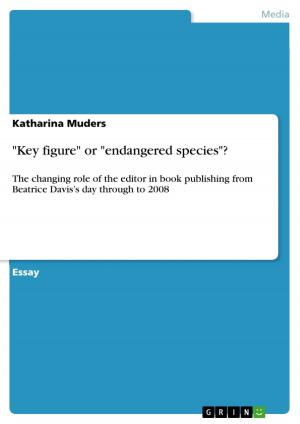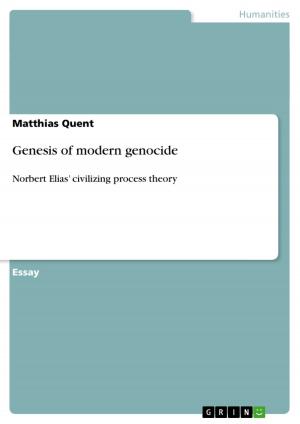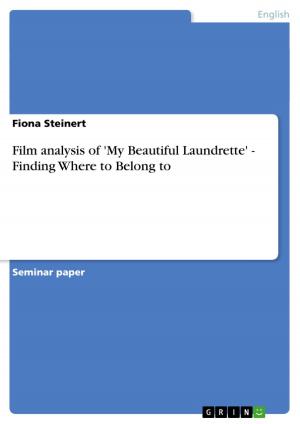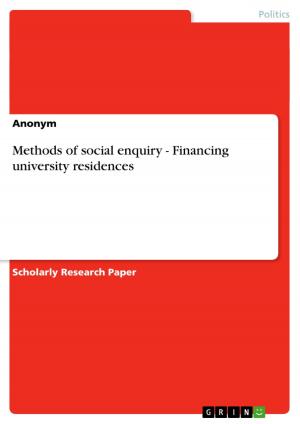Rather Something - On 'nothing' in King Lear
On 'nothing' in King Lear
Fiction & Literature, Literary Theory & Criticism, British| Author: | Stefanie Klering | ISBN: | 9783638821667 |
| Publisher: | GRIN Publishing | Publication: | July 8, 2007 |
| Imprint: | GRIN Publishing | Language: | English |
| Author: | Stefanie Klering |
| ISBN: | 9783638821667 |
| Publisher: | GRIN Publishing |
| Publication: | July 8, 2007 |
| Imprint: | GRIN Publishing |
| Language: | English |
Seminar paper from the year 2006 in the subject English Language and Literature Studies - Literature, grade: 1,0, University of Heidelberg (Anglistisches Seminar), course: Shakespeare and the human evil , 18 entries in the bibliography, language: English, abstract: In Elizabethan English there was no figure standing for 'nothing'. But through the influence of Indian philosophy and mathematical concepts the sign '0' was established in Europe. This introduction had a strong impact - not only in mathematics. The idea assigned to it brought strong dispute with it. Especially in philosophy a lot of questions were being asked: What was the nature of 'nothing'?, Was 'nothing' really nothing?, Could one talk about 'nothing'? Didn't it become something thereby? etc. Questions like these appeared during the Nihilist movement in the 16th century, which eventually led to Nietzsche's statement 'God is dead'. Shakespeare used the term 'nothing' about forty times in different contexts within his tragedy King Lear. However, in most student guides and source books on King Lear, 'nothing' is not regarded as leitmotive. As Brian ROTMAN points out, William Shakespeare was 'in the first generation of children in England to have learned about zero from Robert Recorde's Arithmetic.' In addition to his frequent use of 'nothing', Shakespeare lets two of his main characters deal with the aspect of 'nothing': the play dramatizes '[...] reductions to nothing, charting the annihilation of human warmth, the dissolution of social, natural, familial bonds, the emptying of kindness, sympathy, tenderness, love, pity, affection into hollow shells, into substitutes for themselves[...].' The main thesis of this essay is based on the mathematical concept of 'nothing' in which zero is the narrow borderline between positive and negative. Hence, Edgar can not be right when stating 'Edgar I nothing am.' Although in most secondary sources relevant for King Lear Gloucester usually is regarded as Lear's counterpart in the subplot, the focus in this essay will be put on the comparison of King Lear and Edgar and their individual development throughout the play. In order to proof this thesis, the concept of nothing and its sources will be introduced and explained. Chapter I will give a short overview of the ideas of the mathematical concept of 'nothing'. It will explain where the idea of a thing as 'nothing' comes from, how and when it became known in Europe and especially in Elizabethan England and why the sign '0' was chosen. Chapter II transfers the concept to the play. Although in Shakespearean times mathematics and literature are often regarded as diametral sciences, mathematics are relevant in deed for the reading of Shakespeare's King Lear. The hints on mathematics within the text will be examined in detail.
Seminar paper from the year 2006 in the subject English Language and Literature Studies - Literature, grade: 1,0, University of Heidelberg (Anglistisches Seminar), course: Shakespeare and the human evil , 18 entries in the bibliography, language: English, abstract: In Elizabethan English there was no figure standing for 'nothing'. But through the influence of Indian philosophy and mathematical concepts the sign '0' was established in Europe. This introduction had a strong impact - not only in mathematics. The idea assigned to it brought strong dispute with it. Especially in philosophy a lot of questions were being asked: What was the nature of 'nothing'?, Was 'nothing' really nothing?, Could one talk about 'nothing'? Didn't it become something thereby? etc. Questions like these appeared during the Nihilist movement in the 16th century, which eventually led to Nietzsche's statement 'God is dead'. Shakespeare used the term 'nothing' about forty times in different contexts within his tragedy King Lear. However, in most student guides and source books on King Lear, 'nothing' is not regarded as leitmotive. As Brian ROTMAN points out, William Shakespeare was 'in the first generation of children in England to have learned about zero from Robert Recorde's Arithmetic.' In addition to his frequent use of 'nothing', Shakespeare lets two of his main characters deal with the aspect of 'nothing': the play dramatizes '[...] reductions to nothing, charting the annihilation of human warmth, the dissolution of social, natural, familial bonds, the emptying of kindness, sympathy, tenderness, love, pity, affection into hollow shells, into substitutes for themselves[...].' The main thesis of this essay is based on the mathematical concept of 'nothing' in which zero is the narrow borderline between positive and negative. Hence, Edgar can not be right when stating 'Edgar I nothing am.' Although in most secondary sources relevant for King Lear Gloucester usually is regarded as Lear's counterpart in the subplot, the focus in this essay will be put on the comparison of King Lear and Edgar and their individual development throughout the play. In order to proof this thesis, the concept of nothing and its sources will be introduced and explained. Chapter I will give a short overview of the ideas of the mathematical concept of 'nothing'. It will explain where the idea of a thing as 'nothing' comes from, how and when it became known in Europe and especially in Elizabethan England and why the sign '0' was chosen. Chapter II transfers the concept to the play. Although in Shakespearean times mathematics and literature are often regarded as diametral sciences, mathematics are relevant in deed for the reading of Shakespeare's King Lear. The hints on mathematics within the text will be examined in detail.





